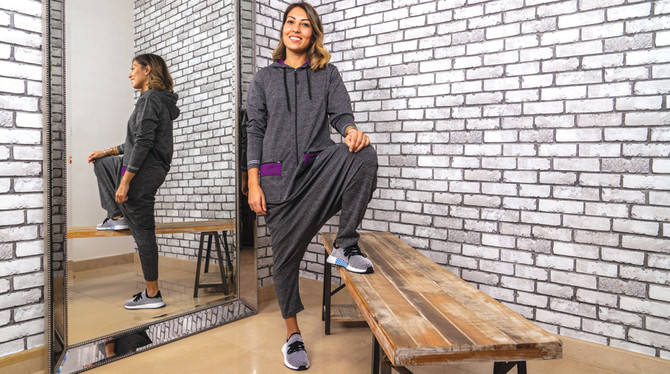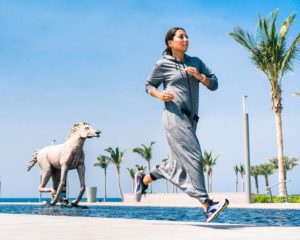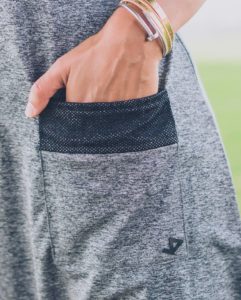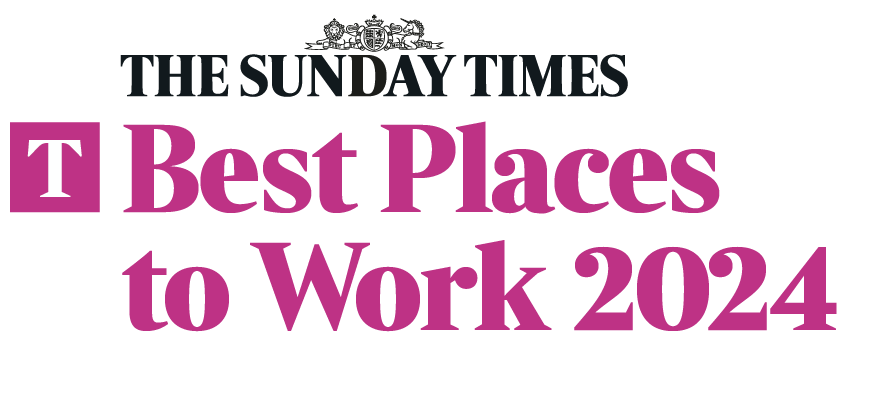Human Insight & Innovation in Saudi Arabia with MULU Athletics

This article is part of our series on Market Insight: Saudi Arabia. You can view the full series or download the report.
At Brand Genetics, we believe in the power of empathy and understanding consumers as human beings first, keeping them at the centre of our insight and innovation.
One example of a company that has taken human insights and transformed them into new innovations is MULU Athletics, a company that designs multifunctional ‘athleisure abbayas’, a sports version of a traditional modest garment worn by women in Saudi Arabia. Lojain Badr Al-Refae, a Saudi personal trainer and founder of MULU, agreed to have a chat with us with about her idea and all things fashion and fitness…

BG: I’d love to know more about you; what is your background and where do you live?
L: I grew up in Jeddah, Saudi Arabia, and moved to the US at the age of 14 for my dad’s job. I lived there for 17 years of my life. After doing my bachelor’s I got married in 2008 and my husband and I decided to move back to Jeddah, and we’ve been living here for 7 years. I’ve spent a major part of my life in the States but I’m 100% Saudi!
BG: What is your daily routine like?
L: I’m a very hands-on mom! I have 2 daughters aged 3 and 7. I like to be there for my kids and take them to school every morning . I still live life as if I’m living in the States. My husband and I used to work out together but missed it when we moved to Saudi because the gyms are segregated here and we couldn’t work out together, so we created a home gym. I teach fitness classes at Pulse Studios until it’s time to pick the kids up again, then we have lunch together and I take my elder daughter to gymnastics – she’s been going for 4 years. Once my husband comes home from work we just relax and have dinner. Sometimes he trains people at our home gym in the evening and I go visit friends. I barely get a chance to sit down – I’m always busy!
BG: What inspired your passion for fashion and fitness?
L: I’ve loved fashion since I was a kid. My dad helped me to pursue my dream and gave me that confidence boost because fashion is a difficult career. I did my bachelor’s degree in Fashion Design, but I knew when I’d move back to Saudi that I wouldn’t be able to have a career in fashion right away because it takes a lot of effort, time, capital etc. So, I decided to put it on hold to pursue another passion of mine – fitness – and completed courses in pilates, cycling and boxing so I could teach in Jeddah. As much as I love it though, I didn’t see myself training people at an older age, so that’s when I decided to work on MULU.
BG: What is MULU Athletics about and how did you come up with the idea?
L: When I first moved back to Saudi, I found it difficult to wear the abbaya and once we started feeling the wonderful changes taking place for women a year or two ago in Saudi, we came up with the idea of a multifunctional abayya. One you can run errands in, you can go shopping in, you can exercise in etc. We spent 1-2 years creating the ‘Freeflow’ abbaya. I was testing it, washing it, wearing, and then we decided we’d go for it. There is something similar in the market already, but our product stands out because it’s custom-made and I hand-pick every yarn that goes into the fabric – it’s well studied, breathable, flexible and doesn’t lose shape.

BG: Did you have any concerns about launching your product?
L: The idea was pretty new, so I was so hesitant at the beginning. Jeddah is a lot more open minded than other cities in Saudi Arabia, but still I thought, “how are people going to react to an abbaya that’s closed from the bottom?”
BG: So how did people respond to the idea? Did it solve a need for women in Saudi?
L: It blew up! We got a lot of amazing feedback. In no time we were everywhere; travelling, going to interviews etc. People were thanking us for making their lives so much easier – making it easy for them to go and get up to pray, or go to the playground with their kids, go grocery shopping and go for jogs outside. We have people send us pictures all the time…someone wearing it at the beach, wearing it on the sand, even while cycling. It really helped those women who wanted to wear something comfortable when travelling, and who wanted to work out and go for walks outside because they were too intimidated by the gym. It allowed them to work out without feeling like they’re wearing tight clothes. It took a lot of time to perfect, but we’re trying to make it even better and taking in feedback to improve it. We have a new version coming out in the next few weeks.
BG: Currently, the abbaya is a garment that is required to be worn by women in public areas of Saudi Arabia, but there are rumours that this won’t be a requirement in a year’s time. What are your thoughts about this?
L: I’ve noticed a lot of change with the abbaya recently – they’re getting shorter, more colourful, and people are becoming more open about how they wear them because it’s the biggest way of expressing themselves. I’m not sure if people will ever get rid of it as abbayas are a strong part of our culture. Even if the government decided to say they’re not needed anymore, people would still want to wear it. Many people find it so comfortable to wear. So, we’re still going to see it in the future, but again, we’ll also see women who can’t wait to take it off!
BG: Saudi Arabia is currently going through an exciting time and experiencing a lot of changes, what are the biggest trends you are starting to see in the country?
L: I feel like people are becoming more aware of health and fitness, more than when I first started training clients. This new awareness arises from people wanting to change themselves and due to broader changes in the country like women being given more responsibilities, being empowered, and allowed to drive.Women have the best opportunities in Saudi right now. They are advancing, being recognised and becoming more confident. Finally, the government is acknowledging women for being successful and running their own companies.
You also see a lot more women working in restaurants, hostesses, airports, officers, at customs etc., being put in jobs that we’re only used to seeing men in, or a foreigner. It makes you feel even more proud to be Saudi. The government is also supporting small businesses by giving them licenses. Before, there wasn’t this option, everyone was doing things privately from home. Now, they’re making it easier.
We’re slowly becoming like any other country. There’s opportunity everywhere…it’s endless. Times are changing, and people now recognise that we are not going to advance if we stay the way we are.
We’d like to give a special thanks to Lojain for taking the time to speak to us, and wish her the best for the future. To follow her work, check out her Facebook page https://www.facebook.com/Mulu-Athletics-1961135900836589/.
Click on this link to gain access to our special report as part of our previous exploration into the changes taking place in Saudi Arabia: https://brandgenetics.preview.uk.com/shifting-sands-the-changing-face-of-saudi-arabia/.

